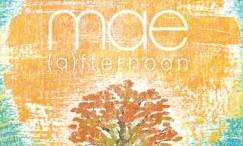12 songs. 12 months. 1 goal: Make a difference.
Mae newly released eight-song EP “(A)fternoon” is part of a campaign effort to raise awareness and monetary support for various humanitarian projects around the world.
Beginning in January 2009, Mae released “Songs of the Month,” with proceeds benefiting Habitat for Humanity and www.donorschoose.org. The first four songs released went on the “(M)orning” EP, the second set on the “(A)fternoon” EP and the final four on the soon-to-be released “(E)vening” EP.
But if you don’t know anything about Mae, you should know that its name is an acronym for multi-sensory aesthetic experience — a project focused on including as many of the senses as possible into the artistic experience. For “(A)fternoon,” it was important to break into the realm of touch.
“‘The Fight Song’ has this open canvas section in the middle,” explained drummer Jacob Marshall. “The audience is watching a screen with this cloud formation taking over. The screen invites you into 3-D mode as the music gets quiet and the storm develops. At the moment of climax, as the storm rushes in and rain is coming at you, Dave hits a button on stage that activates four high-powered fans to push air around the room.”
He goes on to explain that Mae “street teamers” are positioned around the room with spray bottles to squirt water into the air so that the audience feels the effect of the rain as it falls from the three-dimensional storm.
Yet the power of Mae’s artistic endeavors is not lost within their albums themselves. Rich story-telling and character development come alive in “(A)fternoon,” which continues the story of a man searching for significance and purpose.
The opening score, “Good (A)fternoon,” is an instrumental piece that serves to bridge the gap between this album and “(M)orning,” their first album in the sequence. The beginning is filled with anticipation through the use of tweeting and heavy guitars that turns into the sound of slow acoustics before slowly quieting down. The sound of someone getting out of a car fills the void as the person walks through the doors of an airport and the medley of a hundred different languages beckons you. The greetings slowly blend together in what becomes a swirling of white noise. Suddenly, three men sequentially bellow, “Good afternoon!” It catches the listener by surprise, but is warm and welcoming before quickly ushering in “Over and Over.”
For an opening song, “Over and Over” sounds like something you would hear in the middle of an album, but considering that “(A)fternoon” is the second installment in a series, the arrangement makes sense. As the first sense of a progression towards a climax in the story, we begin to see that the main character is eager to take on the changes he vowed to make in “(M)orning,” but quickly realizes that to do so is not as easy as it may seem.
“I woke up … thinking you and I could work it out peacefully / and believe that it was just that easy,” singer Dave Elkins sorrowfully sings. “Here we stand on separate sides / We remain in contrary corners again.”
“Falling Into You,” another instrumental piece filled with wind chimes and slowly rippling guitars that bring the listener to contemplative reflection, follows the emotional intensity of the first few songs. The mood is intimate. It is a time for the listener to think about the relationships that he or she has that need intentional pursuit. Perhaps that relationship is with one’s parents or roommate. More importantly, maybe it is with God. After three minutes, there is a sense of hope, a renewal of friendship, of love. Yet this album as a whole reminds us that becoming better men and women is not without a struggle.
Finally, “Afternoon in Eden” follows “Communication,” a song about identity, purpose and community. Dave sings that “communication is in all of us,” ensuing that it takes the effort of everyone to communicate and that we all need to understand and love each other. When we arrive at the imagined dusk of “(A)fternoon,” the world seems quiet and still. The sound of crickets’ wings brings in the evening, bestowing a time of solitude to regain thoughts and mellow out from the emotional intensity of the afternoon.







